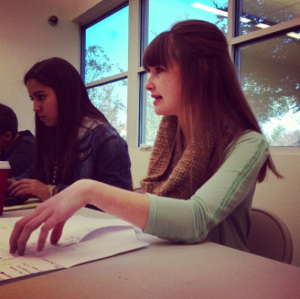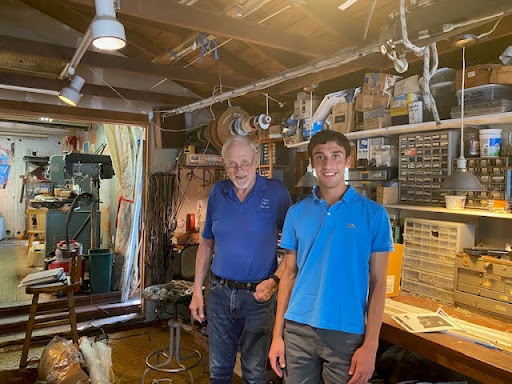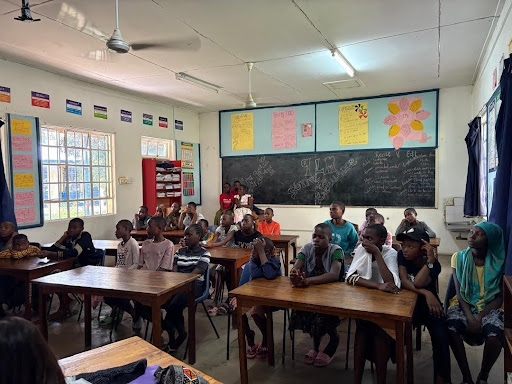Chatting with Rachel Chaffin
Q&A showcasing Chaffin’s (’16) community service

Rachel Chaffin (’16) is a sophomore at the OHS. In addition to her volunteer work, she enjoys playing piano and tennis, reading and writing, and participating in competitive speech and debate.
April 15, 2014
Observer: What kind of service do you do and how does it help the environment, economy, etc.?
Chaffin: The service work I participate in focuses on training young students, particularly grades 6-9, in competitive speech and debate. I have been competing in speech and debate tournaments since I was pretty young, the 2013-2014 season marking my fifth year competing in speech and my fourth in debate. I meet at least once a week with these students to discuss current events and various government policies, before we practice team policy debates, which typically last an hour and 15 minutes. The students are encouraged to research beforehand to find credible sources to back up their arguments, but the point of this sport is to get young people thinking (sometimes on their feet) about the pros and cons of different policies; marine biology, natural resource, military, revenue generation, and foreign policy are a few of the policies the students I work with and I have focused on in the last 3 years. This is excellent preparation for nearly any career path these students will want to follow in the future, and provides them with critical thinking skills they will need on their feet in the future.
Observer: What inspired you to pursue your service?
Chaffin: Over the years, I’ve watched countless students (myself included) grow from terrified debaters, absolutely devoid of confidence, into passionate and persuasive public speakers. Watching young people gain the confidence and passion to argue their beliefs clearly and cohesively, and seeing their incredible perseverance and progress has been inexplicably rewarding, encouraging, and inspiring.
Observer: What are some of your daily tasks?
Chaffin: My main responsibility is coaching the students once a week for a few hours, but throughout the week I work with the students through research on specific policies.
Observer: What is the one thing you most enjoy about your tasks?
Chaffin: One great thing about this service work is that it is just as beneficial for me as it is for them. While I do coach and help with research, I am still a debater myself, and one of my favorite things is being able to work with the students to build our understanding of government policy for both our benefits — learning from them as they (hopefully :P) learn from me.
Observer: What is the most challenging part of your service/job?
Chaffin: Competitive speech and debate is discouraging. It is a humbling, difficult, and taxing sport that is easy to give up on — and the hardest thing for me is seeing just that happen. I can’t stand to see students lose passion about what their opinions or stop putting effort into debates, and it can be difficult to express to students how much you have to invest (in terms of energy, time, and emotion) into speech/debate if you want to be successful.
Observer: Was the process of getting involved in your service easy or a bit more difficult?
Chaffin: Surprisingly, getting involved in speech and debate was an incredibly smooth process for me — I live in Sacramento, CA, an area rife with people interested in this sport, and surrounded by tournament opportunities. The weekly struggle is more significant than getting involved at the beginning, considering how difficult it has become to set aside time throughout the week for debate; not to mention finding time to go to week long debate tournaments, sometimes hundreds of miles away.
Observer: Do you have any advice for students pursuing service similar or identical to yours?
Chaffin: For anyone pursuing competitive speech and debate, I would first say: kudos to you! Speech and debate can be a stressful, discouraging, and occasionally infuriating sport, and I have wanted to throw in the towel more times than I care to admit. Even so, it is a practice that is, on both the short and long term, exceedingly beneficial for a number of pursuits and just daily encounters. One thing that I have learned over my years of involvement with speech and debate is a phrase that bothered me for a long time before I realized what it meant: “the judge is always right,” and it’s so true. If you lost a debate and you can’t boggle your mind for any justification for the judge’s decision, just remember that the judge is always right. If you lost, it’s because you weren’t convincing enough of your arguments, which is why the judge voted against you, making them right. I think this is also a good life lesson to learn now rather than later; just replace “judge” with “boss,” “supervisor,” or “in-law,” and the phrase stands true.





